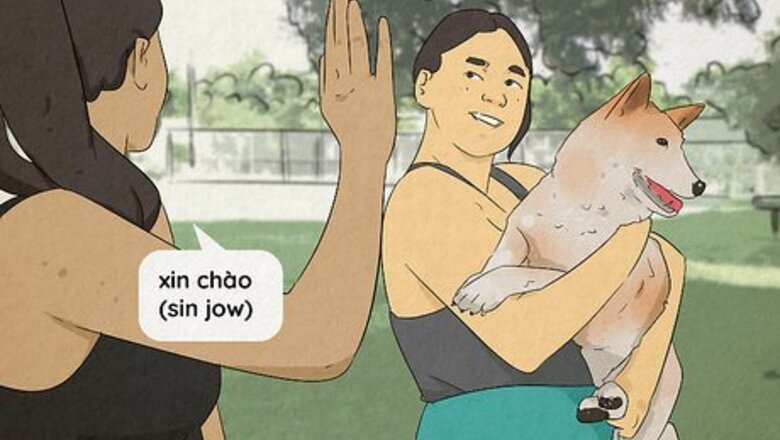
views
The Basic Hello
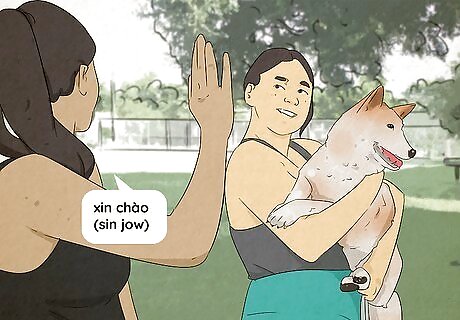
Say "xin chào" as a general greeting. If you only learn one Vietnamese greeting, "xin chào" would likely be the best greeting to choose. Pronounce "xin chào" as: sin jow The word "chào" means "hello" in English, but you would rarely use it alone. Typically, you would need to follow the term with another word based on the age, gender, and familiarity of the other person. Adding "xin" to the front of "chào" makes the phrase more polite. Native Vietnamese speakers would typically reserve this for someone who is older or admired, but non-native speakers can use this phrasing as a polite way to say "hello" to anyone when the correct ending phrase is unknown.
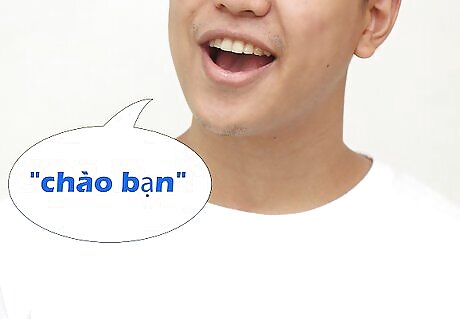
Use "chào bạn" when you're close. If you're close in age to someone, the most accurate way to say "hello" would be "chào bạn." Pronounce "chào bạn" as: jow bahn The word "chào" means "hello" in English, and "bạn" is an informal way to say "you." Since it's an informal version of the word "you," however, avoid using it when addressing elders or others you need to show respect to. This phrase would be appropriate for both males and females. You can also use this phrase to say "hello" to someone you're on familiar terms with, regardless of age or gender.
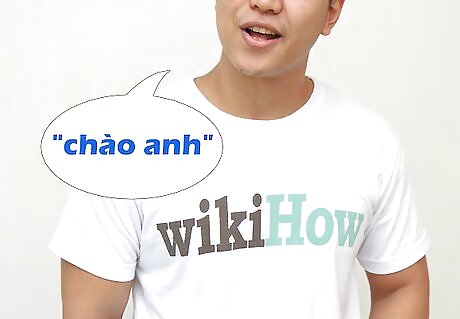
Opt for "chào anh" or "chào chị" when speaking to elders. If the other person is an older male, use "chào anh." If the other person is an older female, use "chào chị." Pronounce "chào anh" as: jow ahn Pronounce "chào chị" as: jow jee The term "ahn" is a polite way to say "you" when the listener is male. Similarly, the term "chị" is a polite way to say "you" when the listener is female. Note that you would rarely use these greetings for someone who is younger or approximately the same age as you.
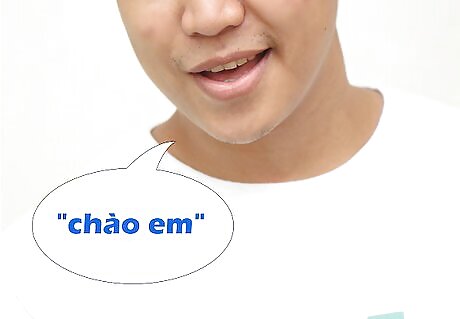
Switch to "chào em" for younger people. If you're speaking to someone notably younger than you, the most appropriate greeting would be "chào em." Pronounce "chào em" as: jow ehm Use this greeting regardless of whether the other person is male or female. Do not use this greeting is someone is older or approximately the same age as you.
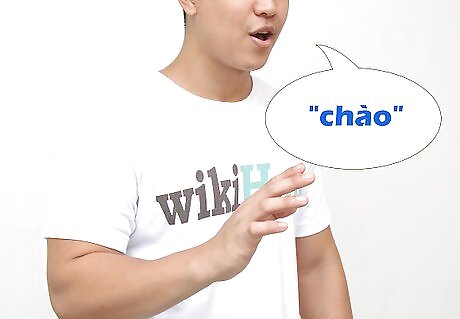
Address someone by name when appropriate. If you're on familiar terms with someone, you can follow the "chào" greeting with that person's name. If the other person is close in age or very familiar to you, you can omit the "you" portion of the greeting and use only the name. On the other hand, if you are not very familiar with the other person or if the other person is older or younger, you may still need to you the appropriate "you" pronoun. For example, if you're speaking to a close friend named Hien, you could simply greet that individual with "chào Hien." If Hien is an older female, you would need to say, "chào chị Hien." If she were a younger female, you would need to say, "chào em Hien." Also note that you should always use the other person's given name, not his or her family surname. This is true regardless of age, gender, or familiarity.
Additional Greetings
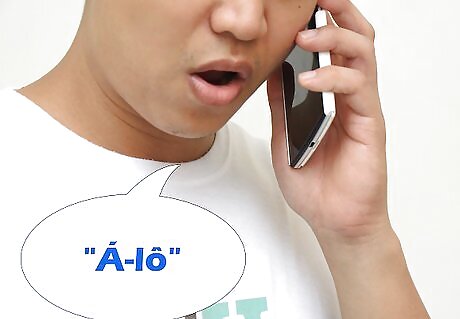
Answer the phone with "Á-lô." When you answer the phone, the most normal way to greet the person on the other end is with "Á-lô!" Pronounce "Á-lô" as: ah-loh This greeting developed before caller identification services were available, so there was no way of knowing who the speaker might be when you answered the phone. As a result, the "you" pronouns are not often used in conjunction with this phrase. While this greeting is very appropriate for the phone, you should not use it when greeting someone face-to-face.
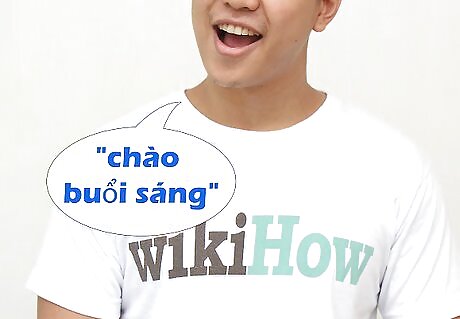
Learn the various time-of-day greetings. While it's fairly uncommon to vary the greeting based on the time of day, you may encounter such greetings on occasion. These greetings are: Good morning: "chào buổi sáng" (jow booh-ee shang) Good afternoon: "chào buổi chiều" (jow booh-ee jeeh-oo) Good evening: "chào buổi tối" (jow booh-ee doy In most situations, you won't need to use any of these greetings. A simple "chào" followed by the appropriate pronoun will suffice. If someone speaks one of these greetings to you first, however, it would be appropriate to return it.

Ask "khỏe không?" Immediately following the initial "hello," you can ask "how are you" by saying "khỏe không?" Pronounce "khỏe không" as: kweah kohng Translated literally, you're asking the other person "healthy or not?" You can use this phrase on its own, but it would be more appropriate to add the most fitting "you" pronoun to the front of the phrase based on age and gender: "bạn" for someone close in age, "anh" for an older male, "chị" for an older female, and "em" for someone younger. For example, you would ask an older male "anh khỏe không?"
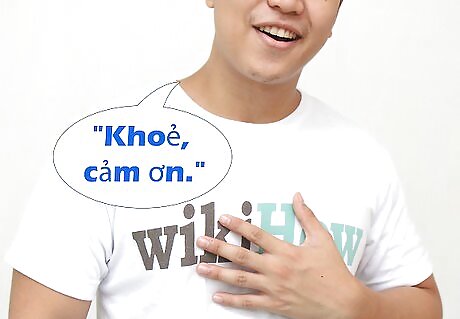
Respond to inquiries about your health. When someone asks you "khỏe không?," there are several ways to reply. A good general response would be "Khoẻ, cảm ơn." Pronounce "Khoẻ, cảm ơn" as: kweah, gam uhhn When translated into English, this response means "I'm healthy, thanks." Following your response, you can return the same question word for word ("khỏe không?") or say "Ban thi sao?," which means, "And you?" Pronounce "ban thi sao" as: ban ty sao
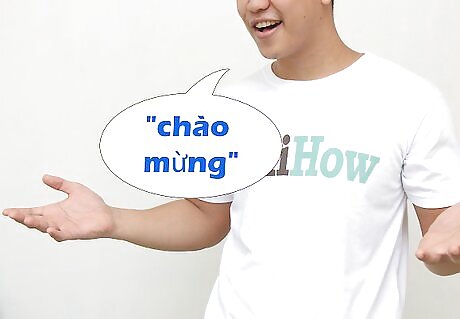
Welcome someone with "chào mừng." If you're greeting someone who has come to your home, workplace, dwelling, or event, you could greet that individual by saying "chào mừng," which is the Vietnamese equivalent of "welcome." Pronounce "chào mừng" as: jow munn The "mừng" portion of this phrase means "welcome," so in essence, you're saying "good welcome." You should also follow this greeting with the appropriate "you" pronoun: "bạn" for someone close in age, "anh" for an older male, "chị" for an older female, and "em" for someone younger. For example, you would say to someone you're age, "chào mừng bạn."











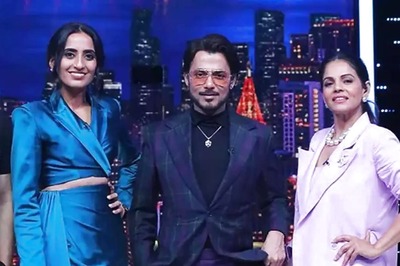

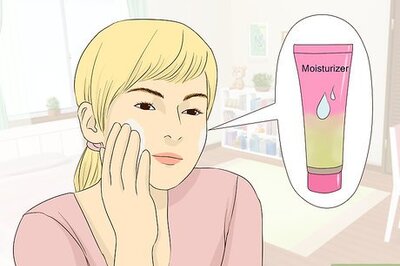

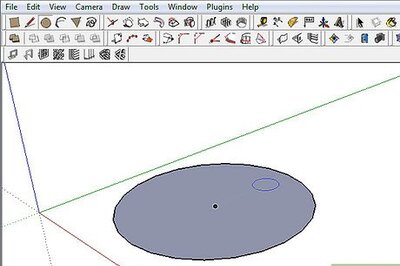

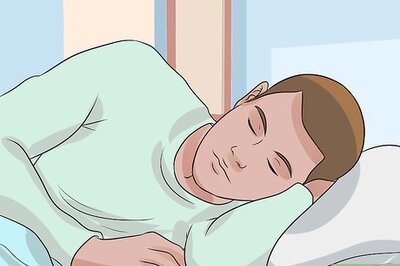

Comments
0 comment